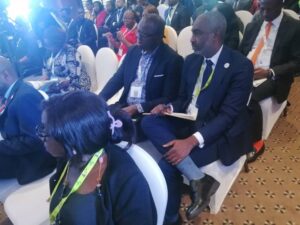By: Goodluck E. Adubazi, Abuja.
The NLNG Deputy Managing Director, Olakunle has described Nigeria’s Gas as a Goldmine, stating that “We’re Sitting on 210 Trillion Cubic Feet”, he further stressed that
Gas demand is projected to grow at a 16.6% CAGR by 2030, reaching 127 billion cubic meters (bcm) by 2050.
Speaking at the 31st Nigerian Economic Summit Group (NESG) design workshop held Tuesday, October 7, 2025, at the Transcorp Hilton, Abuja, the Deputy Managing Director of NLNG, OlaKunle Osobu, had some strong words — and a few laughs, for young Nigerians calling for the country’s exit from OPEC.
“Younger ones say Nigeria should leave OPEC,” Osobu said with a chuckle. “I start to laugh and wonder if they even understand how Nigeria got into OPEC in the first place.”
Speaking during a design session themed “Building Productive Sectors: Investing in Oil and Gas”, Osobu used the moment to reflect on Nigeria’s energy history, including the days when finding gas instead of oil was seen as a failure.

“There was a time when drilling and hitting gas was a bad thing, we called those dry holes,” he explained. “We just covered it up and moved on. The real prize was oil.”
Osobu urged attendees to understand the dynamic nature of global energy trends, pointing out that today’s gas boom was once considered a nuisance.
“Now everyone’s running after gas. The same gas we used to flare off! That should tell you how fast things change. The smartest people are those who can shuffle quickly, adapt fast to new realities.”
Backed with data from the Nigerian Upstream Regulatory Commission, Osobu outlined Nigeria’s massive resource potential:
37.28 billion barrels of proven crude oil and condensate reserves 210.54 trillion cubic feet of natural gas” he added.
He further stressed a reserve Life Index of 64 years for oil and 93 years for gas
Stating that gas demand is projected to grow at a 16.6% CAGR by 2030, reaching 127 billion cubic meters (bcm) by 2050.
But he also acknowledged the sector’s struggles, including underinvestment and inefficiencies, urging stakeholders to focus on realistic and implementable strategies.
Osobu emphasized the importance of actionable solutions from the summit, not just lofty ideas.
“Don’t just say Nigeria should leave OPEC, tell us how. Should the Minister write a letter? Who handles what? That’s the level of detail we need.”
He challenged every breakout group at the summit to attach clear implementation strategies to their recommendations.
“That’s when you’ve done due diligence. That’s when government can actually act.”
In closing, Osobu praised the session’s organizers and participants for fostering conversations that look beyond the surface.
“I always enjoy listening to the Honorable Minister because it crystallizes everything , the holistic, global picture of why we do what we do.”
With oil spill incidents on the decline in 2025 and increased attention on pipeline sabotage, Osobu gave a nod to the Minister of Petroleum for ongoing reforms.
Nigeria’s oil and gas future is complex, evolving, and too important for half-baked takes.
“You want to change things? Then bring the ‘how.’ Not just the ‘what,’” Osobu said